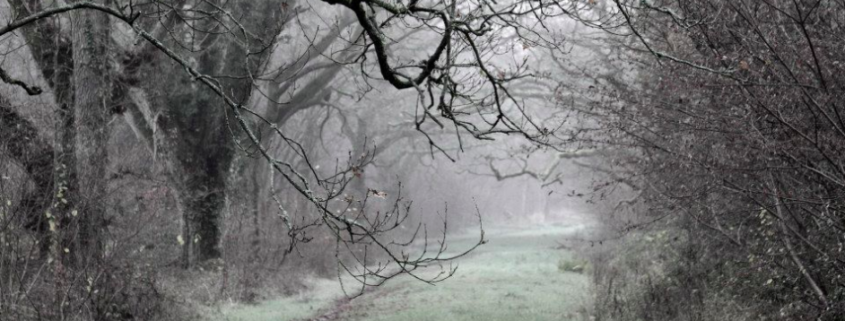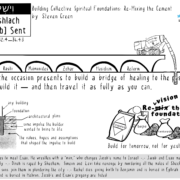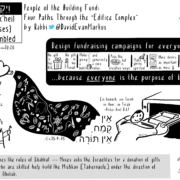The Spiritual Life is Lonely

“A Foggy Passage” Simon Kingsworth
The farther you progress in the spiritual life, the lonelier it gets.
The topics that used to consume you may now only arouse faint interest. (How many books did I read about “the future of the church” in my late twenties and early thirties? Hundreds. How many have I read since we moved to the island three years ago? None.)
The dichotomies that used to agonize you now all seem like artificial constructions that obscure a deeper Truth. (Is this an outward work? An inward work? Is this love of God or love of neighbor? How do you balance work with rest? Anger with forgiveness?)
The conversations that used to energize you all deflate like sad little balloons, without enough hot air to keep them afloat anymore. (In my case, denominational politics, theological esoterica, and the over-earnest discussion of “what does it mean to be the church?”)
Instead, you find that your gaze turns inwards: to the places of deepest unspoken hurt, to the deeper comprehension of self, to the wrenching, painful work of giving up all those external attachments that you thought were You.
In the process, you also discover loneliness.
I’ve discovered that there are precious few people who are able to have those conversations about matters like this, much less engage in this work with the necessary degree of maniacal consistency.
After all, it is a journey that their friends will not encourage them to take, because it can strip them of the unspoken tribal prejudices and previously energizing interests upon which friendships are based.
After all, it is a journey which our society, built upon superficial urgency and the frantic pursuit of novelty, is designed to prevent. (Don’t believe me? How many times did you check your smartphone today? And how many of times did you check it because you grew uncomfortable, bored, upset, or disturbed with something which you would prefer be left unnamed?)
After all, it is a journey which their churches, which institutionally depend on busy people highly invested in externals, simply do not have the capacity to imagine.
And the journey is hard, because the road is terrifying. From the comfortable ruts of life, you emerge into a dangerous, dark wilderness of spirit, filled with monsters of your own making. The road ahead seems like no more than a vague trail (pray to God for something as clear as a vague trail!) with the road behind always clear as day, beckoning for you to come back to safer ground.
My experience? Most people, if they don’t have journey companions, will take a few steps on that terrifying trail, and then retreat back to the comfortable territory of their familiar existence, filled with friends and jobs, religious observances and books, momentary bursts of passion brought on by the novelty of a new spiritual idea, and the steady, familiar rhythm of prejudices and interests that were formed in childhood.
The problem is that God (and by God I most specifically the Love that birthed the universe, that birthed each of us, and that lies at the truest center of our being,) can only be encountered fully in that dark wilderness of spirit.
Ideally, our spiritual communities exist so that people can find companions and guides for exactly this journey; but maintaining that communal ethos requires spiritual vigilance and produces very few institutional returns. This is why the communities that call themselves churches have turned instead to peddling a hyper-commodified mass market version of themselves, so that people may learn to possess God rather than learning to let God possess them. (This may be true for other religious and a-religious traditions, but I’ll let them speak for themselves on this count.)
I’m thankful that I’ve found a community, albeit a temporary one, that has helped me take my first full steps into the wilderness of my own soul. I also hear an echo of loneliness, sometimes even terror, knowing that soon that community will come to an end, and it is not a given that I will find other people to journey with me.
I don’t have any reassurances for me, but I do have advice for you if who have heard God’s call to walk a deeper path, even if that call is heard only in whispers.
First, step out the door on that new road, even if all you have is a backpack full of questions.
Second, find some people. Be wary of the good church people. Look for the pones hovering around the edges (or the comfortably self-differentiated ones in the middle.) Look for the ones who talk more about God and about people and less about “church”. Look for the ones who have a smiling, self-deprecatory honesty. Look for the ones who seem like actual humans, not religious facsimiles of themselves.
Finally, ask them to join you on the journey. Some will look at you oddly. Some will say “no”; or say “yes” but actually mean “no” when they realize what is involved. But remember, God is gracious, and if God is pulling you into the wilderness, then God will send you a couple of people who might dare to say “yes” along with you: people who will pick you up when you stumble, or get lost, and point you back into the darkness and say “keep going”.
Because, in the end, this is really the only journey ultimately worth taking.
It is just as the great Quaker mystic, Thomas Kelly, says,
Out in front of us is the drama of [people] and of nations, struggling, laboring, dying. Upon this tragic drama in these days our eyes are all set in anxious watchfulness and in prayer. But within the silences of the souls of [people] an eternal drama is ever being enacted, in these days as well as in others. And on the outcome of this inner drama rests, ultimately, the outer pageant of history.
It is the drama of the Hound of Heaven baying relentlessly upon the track of [humans]. Is the drama of the lost sheep wandering in the wilderness, restless and lonely, feebly searching, while over the hill comes the wiser Shepherd. For His is a shepherd’s heart, and He is restless until He holds His sheep in His arms. it is the drama of the Eternal Father drawing the prodigal home unto Himself, where there is bread enough and to spare…And always its chief is – the Eternal God of Love.
THOMAS KELLY. A TESTAMENT OF DEVOTION. 1941.

By Ben Yosua-Davis. Reposted with permission from A Glorious Mess.









